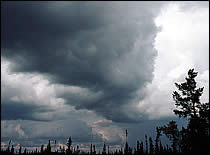Natural Disasters and People Living with HIV and AIDS
Hurricane Isaac’s impact on the Gulf Coast last week, ongoing forest fires in several Western states, and today’s earthquake in Costa Rica are all reminders of the importance of disaster preparedness, especially for people living with HIV/AIDS. In recognition of September’s observance of National Preparedness Month, we’re re-posting this blog entry from May 2011. Read more about National Preparedness Month from the Department of Homeland Security and the CDC.

As if the tornadoes that recently devastated several communities including Joplin, Missouri, and Tuscaloosa, Alabama and the flooding along the Mississippi River weren’t enough, June 1 marks the start of hurricane season. These are all stark reminders of the stunning impacts these forces of nature can have on anyone and the importance of doing what we can to be prepared to the extent we can.The effects of these disasters on people living with HIV and AIDS can be particularly severe:
- Natural disasters may affect things like air and water quality—which can make a person living with HIV/AIDS (PLWH) susceptible to infections.
- People living with HIV may lose or run out of medications during a disaster, resulting in possible interruption in treatment.
- Access to care can be hampered due either to the destruction of a health care facility or the PLWH’s relocation to another community.
- A disaster can disrupt mail service for days or even weeks which can impede benefits such as Social Security or Medicare. Similarly, receipt of benefit checks (but not electronic payments) can be disrupted due to the need to relocate.
Any of these circumstances can disrupt the continuity of care for those living with HIV and result in negative health consequences. It is possible, however, to mitigate some of these possible outcomes with some planning.Preparedness MattersNow is the time to plan ahead for what you may need to stay safe, healthy, informed, mobile, and independent during a disaster. CDC’s recent advisory regarding preparedness for a zombie apocalypse (or hurricanes, flood or other emergencies) offers a number of useful preparedness tips that we may all wish to pause and consider. In addition, read our HIV.gov page about Natural Disasters and People Living with HIV/AIDS for more information and tips to help you prepare your plan. Finally, visit Ready.gov for more information on what you can do to make preparations for dealing with a natural disaster or other emergency situation. The site includes a page on special considerations for people with disabilities, some of which may be relevant for you to consider. We hope you’ll never need it, but we’ll be glad that you have a plan in the unfortunate event that a disaster does strike your community.
Do you have an emergency plan? What special features would you recommend be considered by people living with HIV/AIDS? Share your thoughts in the comments section below.